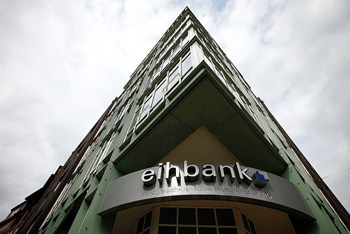 Wall Street Journal: Days after India’s government clamped down on the main conduit Indian companies use to pay for Iranian oil, New Delhi and Tehran have opened a temporary channel for transactions, a senior Indian official said Tuesday—one that involves routing payments through an Iranian bank that is already under U.S. sanctions.
Wall Street Journal: Days after India’s government clamped down on the main conduit Indian companies use to pay for Iranian oil, New Delhi and Tehran have opened a temporary channel for transactions, a senior Indian official said Tuesday—one that involves routing payments through an Iranian bank that is already under U.S. sanctions.
The Wall Street Journal
By RAKESH SHARMA And JAY SOLOMON
 Days after India’s government clamped down on the main conduit Indian companies use to pay for Iranian oil, New Delhi and Tehran have opened a temporary channel for transactions, a senior Indian official said Tuesday—one that involves routing payments through an Iranian bank that is already under U.S. sanctions.
Days after India’s government clamped down on the main conduit Indian companies use to pay for Iranian oil, New Delhi and Tehran have opened a temporary channel for transactions, a senior Indian official said Tuesday—one that involves routing payments through an Iranian bank that is already under U.S. sanctions.
The move essentially moves India from one uncomfortable spot into another, and could place Indian firms at loggerheads with the U.S. legal system. Under U.S. legislation enacted in July, any foreign firm dealing with Iranian entities sanctioned by Washington could also find itself banned from conducting business inside the U.S.
The U.S. Treasury blacklisted Hamburg-based European-Iranian Trade Bank AG Bank in September, saying it provided a financial lifeline to Iranian companies that it alleges support weapons proliferation.
“India is finding how difficult it’s becoming to do business with Iran globally,” said Avi Jorisch, a former Treasury official who has tracked the Iranian bank. “The number of legitimate channels is constricting.”
The clock has been ticking for India to find ways to pay for critical supplies of crude oil from Iran. Last week, India’s central bank, the Reserve Bank of India, said all trade-related payments with Iran had to be processed outside the Asian Clearing Union, a trade-finance clearinghouse through which Iran does most of its business with India.
The Obama administration has raised its concerns with India about the Clearing Union, due to fears Iran has used it to shield its companies from U.S. sanctions.
The senior Indian official told reporters Tuesday that Iran’s state-owned National Iranian Oil Co. sent a letter to Indian oil companies saying payments to Iran could be routed through a euro account at European-Iranian Trade Bank, or EIH Bank. The letter wasn’t made public.
EIH isn’t subject to sanctions by the United Nations or the European Union. But in September, the U.S. Treasury blacklisted the bank, barring it from conducting any business inside the U.S. and freezing any assets it holds in the American financial system.
Indian firms dealing with the bank could face the same penalties under new U.S. legislation passed into law by President Barack Obama in July.
The senior Indian official said Tuesday that Indian oil companies wouldn’t themselves open accounts at EIH. Rather, he said, the government has advised oil companies to open individual accounts with government-owned State Bank of India—India’s largest lender—which has a branch in Frankfurt. State Bank of India, in turn, would open an account with EIH through which oil firms could pay Iran, the official said.
That arrangement would appear to place State Bank of India in a vulnerable position. The lender has branches in New York, Chicago, Los Angeles and Washington, which could all be affected by the U.S. legislation. American banks holding corresponding banking relationships with the State Bank of India could also potentially be affected.
If the U.S. government were to blacklist the State Bank of India for its dealings with EHI, the Indian lender could seek a waiver from Washington on national security grounds. In this case, India might argue that it needs access to Iranian oil to maintain adequate energy stockpiles.
State Bank of India couldn’t be reached to respond to questions about the arrangement and how it was reached.
The National Iranian Oil Co. and the Iranian central bank couldn’t be reached to comment.
A spokesman for EIH in Germany said the Iranian bank “continues to handle banking transactions.” He declined to discuss details of the Iran-India transactions or the U.S. sanctions against the bank. In the past, EIH has denied any violations of German law or sanctions.
In an email to The Wall Street Journal, a spokesman for the German Ministry of Economics said EIH operates “under special strict controls of its oversight agencies.”
EU investigators are currently sifting through years of EIH banking transactions to check for possible violations, a person familiar with the matter said. This person said a decision on whether the EU should formally designate EIH for Iranian proliferation sanctions would be based on the results of the still-incomplete investigation into the bank.
Describing the latest payment mechanism as a stopgap matter, the senior Indian official said a delegation of Indian officials will be visiting Tehran in mid-January to discuss a longer-term oil-payment mechanism.
New Delhi is facing pressure to resolve the impasse quickly. Iran, the second-biggest supplier of crude to India after Saudi Arabia, accounts for about 14% of the country’s oil-import bill. India’s Mangalore Refinery & Petrochemicals Ltd., for one, imports about 7.6 million metric tons a year from the Iranian national oil company, accounting for around 60% of its annual crude-oil requirements.
S. Sundareshan, a top official at India’s oil ministry, said Tuesday that there has been no disruption in supplies. “Tankers are loaded,” he said. “It is being resolved. We will find some way.”
India appeared at the end of December to join U.S. efforts to stifle trade with Iran, which the U.S., European Union and other international governments accuse of pursuing nuclear weapons, a charge Tehran denies. India’s central bank instructed the country’s lenders to stop processing current-account transactions with Iran using the Asian Clearing Union, and told Indian firms they couldn’t use the mechanism to pay for oil or gas imports.
The union is a clearinghouse arrangement among nine central banks, including that of Iran and South Asian nations, that settles trade-related payments between members every two months. This cycle led to pressure from the U.S., which says the system is opaque and Tehran could be using it to finance its alleged nuclear-weapons program.
—Subhadip Sircar in New Delhi and David Crawford in Berlin contributed to this article.


